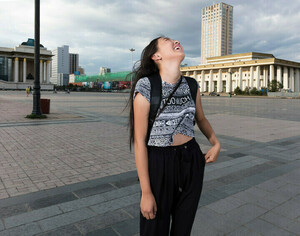
The Photography Gallery at Riley Hall is proud to announce Hero City—an exhibition of photographs by Meghan Kirkwood. The exhibition is open from February 28, 2022, and will run until March 25, 2022.
Meghan Kirkwood is an Assistant Professor of Visual Arts and serves as area head of Photography. She earned a B.F.A. from Rhode Island School of Design in Photography before completing her M.F.A. in Studio Art at Tulane University and PhD at the University of Florida. Her photographic research looks at the ways in which landscape imagery can inform and advance public conversations around land use, infrastructure, and planning.
Kirkwood’s work has been exhibited internationally in solo and group shows and her photographs are held in several private and public collections, including the RISD Museum of Art, the Museum of Contemporary Photography in Chicago, University of Idaho, Minot State University, North Dakota Museum of Art, and the University of Florida Genetics Institute. Her work has been featured in publications such as Lenscratch, Don’t Take Pictures, Oxford American, New Landscape Photography, Landscape Stories, Don’t Smile, and Ours.
In tandem with her studio practice, Kirkwood also researches in the fields of African art and the history of photography. Presently, her writing focuses on the uses of landscape imagery by contemporary South African photographers. Her writing has been published in Lenscratch, Social Dynamics, Exposure, Photography and Culture, Landscape Journal (forthcoming), and Photographies (forthcoming).
Hero City
These silver gelatin photographs and color prints are part of a documentary project begun in 2007 and continued again in 2017 about modern Mongolia and its capital city, Ulaanbaatar. The series title “Hero City,” makes reference to the chosen name for the urban center before pressure from soviet activists led to the renaming of the city as it is known today, Ulaanbaatar (city of the Red Hero).
Mongolia has a unique and storied history, most recently marked by its transition from communism to democracy following the fall of the Soviet Union. This transition was guided by international agencies such as the International Monetary Fund, the World Band, and the Asian Development Fund, but the nation’s swift entry into a purely market economy has brought many challenges for its citizens. Since the 1990s literacy rates have fallen and nearly a third of citizens live below the poverty lines. Many services and infrastructure provided for Mongolians under communist rule were unsupported in a capitalist setting, causing great disruption for many of the nation’s three million people.
Nevertheless, economists and organizations such Citigroup view and label the country as a “global growth generating” nation and tout the nation’s business-friendly environment for outside investors. Accordingly, Mongolia offers a prescient look at the disconnect between prescriptive policies and the cultural and political realities that limit their success.
My images seek to capture these tensions, while at the same time drawing attention to the rich and thriving culture that animates this young Asian nation. As an outsider, I aimed to photograph places of interaction, crossroads in the city, and individuals at work at a key period in the nation’s history, rather than attempt to relay a comprehensive narrative.